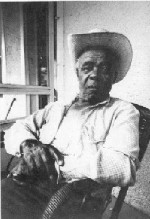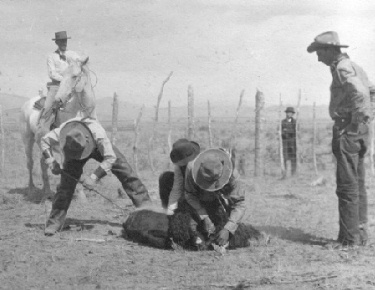HOWARD
HICKSON'S HISTORIES
[Index]
Black Wrangler - Part Five
Reminiscences of Lawrence Jackson
Edited by Howard Hickson
 Photograph
of Lawrence Jackson by Jonas Dovydenas, Lenox, Massachusetts. With
his permission. Photograph
of Lawrence Jackson by Jonas Dovydenas, Lenox, Massachusetts. With
his permission.
WINNEMUCCA BANK ROBBERY
We used to ship horses from Winnemucca. A
lot of kids hung around the stockyards whenever we shipped. They are all
grown now and have kids of their own. They still remember me and say I
look the same, but I sure don't feel the same.
Winnemucca was the scene of one of the last
Western style bank holdups back in 1900. Three men held up the place, the
First National Bank. Butch Cassidy's gang was running at-large then, so
naturally they was accused, but nothing was ever proved. Whoever they was,
the made a clean getaway. An old cowboy name Park Gossett told me that
the Cassidy bunch didn't do it. He said it was the Whitney brothers from
Cokeville, Wyoming, and a man that ran with them. Park said the two brothers
and their partner left Cokeville about two weeks before the robbery, headed
southwest in the general direction of Winnemucca with a string of good
horses.
After the bank was robbed, the posse chased
them in two groups, one on the ground and the other by rail. The ground
posse caught up with the robbers, but was ambushed. No shots was fired.
The gang leader told them that the posse was following too close for comfort.
He said they got nervous when people crowded them and that somebody might
get hurt. He told the posse to turn around go through Tobin's Bank Ranch
field and pick up a sack of change the robbers had dropped. The sack was
found and it contained $60 worth of nickels, dimes and quarters. The gang
left a cold trail into Idaho and was never caught. I tried to get more
information from Park, but he was through talking.
Editor: There is continuing controversy
about the robbery. Some historians maintain that the robbers were Butch
Cassidy, the Sundance Kid, and Bill Carver. It is generally agreed that
the Whitney brothers did have some hand in the event. Cassidy himself admitted
the holdup by sending First National Bank President George Nixon a copy
of the famous Fort Worth photograph and "thanked" the bank for the "withdrawal."
He wouldn't, of course, be the first crook to claim a crime he didn't commit.
They have to maintain good public relations and keep their name before
the public.
PAT REAGAN, ALIAS PAT RUSSELL
One day, Pat Reagan, who had escaped from the
pen in Carson City, came to Gene Howard's place with a posse hot on his
tail. He stayed the night. In the morning, he heard the posse coming and
Pat told Gene to go outside, get some tools, and pretend to be fixing the
fence. He warned Gene to stay in sight and be careful what he said, He
said he would be a in a dry wash close by, with a rifle.
The sheriff rode in roughshod and asked where
Reagan was, that the neighbors said he had spent the night at the Howard's
place.
"Yes," said Gene, "he did, but he's not here
now. I don't know where he went, but he might have gone over the hill toward
the Quinn River."
A fellow in the posse pointed out Pat's horse
in the corral. Gene thought he was a goner but, thinking fast, he explained
that Pat's nag had give out and he had taken one of Gene's horses. When
the posse left, Pat came out and thanked Gene. Mrs. Howard fixed Pat some
breakfast and left some money on the table for him.
Sometime later, the sheriff came back mad
as a horny toad and asked why Gene had lied to him. He said that as soon
as the posse left, Reagan was seen leaving the place.
Gene said, "Let's walk out to that ditch and
I can show you better than I can tell you."
They walked out and Gene pointed out where
Pat had been laying, with his rifle trained on the sheriff all the time.
ROUNDUP REPS
During roundups, an older man who was trusted
and could be depended on, represented the outfit's interests. These men,
call reps, for short, took his outfit's cattle and horses home.
Every spring the Indians from the Owyhee reservation
had their annual roundup and all the stockmen sent reps to claim their
stock. Gorham sent me and Gene to represent his interests. There was about
fifty Indians there and I knew most of the older ones.
The Garat ranch furnished the cook and chuckwagon,
but the government supplied most of the food. That cook had three of the
biggest pots I ever saw, all about the size of old-fashioned washtubs.
One was full of beef stew, one full of beans, and the other filled with
potatoes with the jackets on. There was several gallons of coffee and bread
was stacked like cordwood. Everybody had all they could eat.
When we had picked out our stock and was ready
to go back to our home spread, I saddled a big sorrel horse named Head
Light. He had a great big white spot on his forehead. I knew I had no business
on that horse. Gene told me to catch something else, but I wanted to show
off. I never was a bronc rider. When we started, Head Light bucked up among
the wild horses and we lost them. Head Light almost lost me, but I rode
him out for a while and took an awful pounding. I was sore and stiff for
two weeks.
Gorham found out why we lost the horses and
bawled me out. I knowed it was my fault, but I quit anyway. It was about
time to make a move, so I saddled my horse and rode off.

Branding on the Spanish Ranch about 1925.
Photo from the Northeastern Nevada Museum, Elko.
JOHN G. TAYLOR'S OUTFIT
I stopped at Golconda. At breakfast in Joe
Fait's hotel, I noticed a big man in boots and a Stetson sizing me up.
When I went to the cashier to pay, he was there and reached over and took
my check.
"This one's on me. Are you Lawrence Jackson?"
he said, "My name is Ed Buschell, cowboss for John G. Taylor. I have a
trail herd ready to start for summer range, but I'm short a cook and horse
wrangler. Heard you were in town looking for a job. Hear you did real well
for the Double Square outfit. If you want the job, your salary starts right
now."
A word about John G. Taylor. He was a fiery
old Scotsman and I mean just that. He was full of fire. Even in his seventies,
he would shed his coat and fight most anyone. One time, he hired a bodyguard
when cattlemen were giving him a hard time for going into the sheep business.
Taylor and his guard got into an argument and Taylor whipped him, then
fired him.
The day he died, he was in his eighties then,
he looked hale and hardy. In fact, he and some guy got in an argument and
Taylor threatened to take him on. Naturally, the fellow wouldn't jump on
an old man. He got back from a walk around 10:30 in the morning and told
his cook that he was going to lay down until dinner was ready. When she
went to call him, he was dead. He wasn't in bed, just laying across it.
It looked like he died on his feet and fell across the bed, a fitting end
for an active man. No suffering.
Off and on, I worked for him about twenty
years, even through the Great Depression. I hope I never see anything like
that Depression again. I even saw women carrying babies riding freight
trains.
BILL JOHNSON
Bill Johnson was a bronc rider, one of the
best. Twisters and rough-string men we called them. Bill used to hanker
for outlaw horses and would try every one that he heard couldn't be rode.
In later years, after getting hurt a time or two, he got spooked out and
was just an old bronc rider that had lost his nip, but keeps staying around
trying to convince hisself he ain't scared. It's a pitiful sight.
TRAIL BOSS
Most of them old trail bosses was cranky and
grouchy as an old bear just come out of hibernation. Even had a permanent
scowl on their faces, but you couldn't blame them too much. They had a
lot of responsibility. When a herd is on the trail he is to blame if anything
goes wrong. He sometimes works short-handed, sometimes with green hands
that never cowboyed before, but the big boss expected results just the
same. Some of the men the office sent out actually didn't know how to put
a saddle on a horse. If the trail boss wasn't mean, he would get that way,
sooner or later.
The Taylor cowboss, Bob Buchanan, wasn't very
likeable. He had trouble keeping cowboys but I stayed on until late fall,
then thought I better find me a winter job.
FAIRCHILD RANCH
I ambled down toward Tuscarora and stopped
at the Fairchild Ranch. The elder (T.T.) Fairchild was a state senator
then. He had four boys. They was all like the old man, no matter who you
was, you was always welcome to put your feet under the table. When it came
time for bed, there came the Senator, hisself, with an armload of blankets,
quilts and a pillow.
Dave Abel, a cattle buyer, was at the breakfast
table the next morning. He said he had a bunch of steers at Beowawe, at
the Horseshoe Ranch, and asked me if I was looking for a job.
It was a two-day ride from the Fairchild place
to Beowawe and was all new country to me. Abel drew me a map and said I
couldn't go wrong. That night, I stopped at the St. John Field and showed
the map to Lige Bingham, an old one-eyed cowboy, and he told me he could
show me a shortcut. Lige said to cross Boulder Flat, instead of going around
and, when I came to a big round hill, to take the cow trails over it instead
of following the road. He said I could see the road from the top of the
hill.
Next: Jackson finds a moonshine still, talks about a saloon fight,
tells how a chuckwagon is set up, and details a death in the desert.
©Copyright 2000 by Howard Hickson. If any portion
or all of this article is used or quoted proper credit must be given to
the author.
[Back to Hickson's Histories Index]
|
 Photograph
of Lawrence Jackson by Jonas Dovydenas, Lenox, Massachusetts. With
his permission.
Photograph
of Lawrence Jackson by Jonas Dovydenas, Lenox, Massachusetts. With
his permission.
